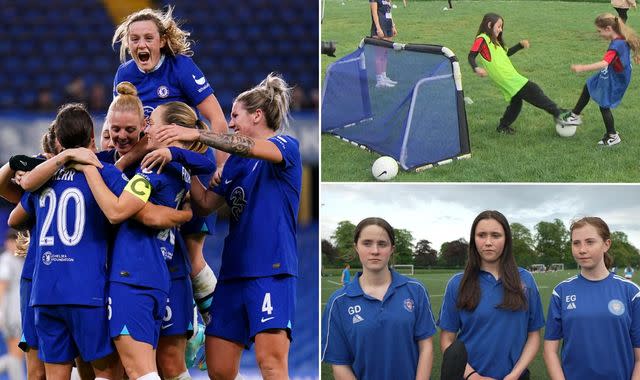Girls community football clubs struggling for survival despite huge success for top of the league teams

Grassroots girls football clubs are increasingly struggling for survival as the women's game soars in popularity.
Victory for England's Lionesses last summer in the Euros has helped cement support for the game with today's FA Cup Final between Manchester United and Chelsea a sell-out at Wembley for the first time ever.
All 90,000 tickets have been sold, almost doubling the size of the crowd compared to the event last year.
But rising costs of energy, facilities and insurance are leaving clubs like Actonians LFC in west London with the prospect of some tough decisions ahead.
"It's tight, in terms of cost. Everything has gone up," says the club's chairperson, Linda Fox.
Read more:
Chelsea agree deal with new head coach
Love Island star says he was embarrassed to be released from football club
Eurovision as it happened
"If it carries on, the fear is we have to decrease our training hours and the space that we can afford to rent, which in turn will affect the level of the coaching and the development of the players."
The club isn't alone.
More than nine out of ten community sports groups said they were "extremely or fairly concerned" about the impact of increased costs on their operations in the recent Sported/Ring Community Pulse survey of 3,000 organisations.
And it's feared that young talent will be lost if clubs go under as they can't afford to pay the bills.
At Actonians, there is a reluctance to pass on the extra cost to parents when kit, boots and travel to and from fixtures are already so pricey.
'Football is turning into a middle-class sport'
Former professional footballers Fara Williams and Katie Chapman go into schools to encourage girls to play.
But Fara, who played for England from 2001 to 2019, says so much has changed since she was a child when football "was one of the cheapest sports to play".
"I think football is now turning into what I would say is a middle-class sport which it certainly wasn't when I was growing up. I think that's the difficulty," she says.
"People are struggling to pay and fund the sport so I think there certainly needs to be some funding into that to allow access for all if we want our game to really grow and develop the way it should."
Former England player Katie, who ended her career at Chelsea, is optimistic for the future but says more needs to be done to improve accessibility at the grassroots level.
"We want to produce our own players. We want to produce our own girls coming through the system to have the opportunity to become professional footballers and I think with money and investment that will happen," she says.
The government recently promised equal access to football in schools for boys and girls, backed by a multimillion pounds investment that will also help pay for afterschool activities.
But for community-based clubs, times are tough and there's no solution in sight.

 Yahoo News
Yahoo News 
